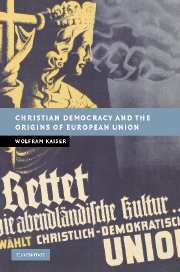Book contents
- Frontmatter
- Contents
- Acknowledgements
- Abbreviations
- Introduction
- 1 All paths to Rome? Transnational Catholicism in the nineteenth century
- 2 Under siege: Catholic parties in interwar Europe
- 3 After Versailles: left-Catholic cooperation
- 4 In the shadow of dictatorship: contacts in exile
- 5 Hegemony by default: Christian democracy in postwar Europe
- 6 Creating core Europe: the rise of the party network
- 7 Deepening integration: the supranational coalition embattled
- 8 Informal politics: from Rome to Maastricht
- Bibliography
- Index
- NEW STUDIES IN EUROPEAN HISTORY
5 - Hegemony by default: Christian democracy in postwar Europe
Published online by Cambridge University Press: 14 July 2009
- Frontmatter
- Contents
- Acknowledgements
- Abbreviations
- Introduction
- 1 All paths to Rome? Transnational Catholicism in the nineteenth century
- 2 Under siege: Catholic parties in interwar Europe
- 3 After Versailles: left-Catholic cooperation
- 4 In the shadow of dictatorship: contacts in exile
- 5 Hegemony by default: Christian democracy in postwar Europe
- 6 Creating core Europe: the rise of the party network
- 7 Deepening integration: the supranational coalition embattled
- 8 Informal politics: from Rome to Maastricht
- Bibliography
- Index
- NEW STUDIES IN EUROPEAN HISTORY
Summary
It appeared unlikely that Christian democracy would emerge victorious from World War II. Conservative political Catholicism was discredited. Its interwar economic policies seemed to have aggravated the effects of the world economic crisis, contributing to the breakdown of democratic regimes everywhere. Many conservative Catholics subsequently supported clerical dictatorships and fascism. Moreover, most Catholics who opted for resistance against the German occupation were democratic left-Catholics – a minority within the Catholic political camp in interwar Europe. At the same time, the Catholic Church hierarchy was morally compromised. The Vatican had strongly supported clerical dictatorships out of fear of communist revolution in Europe. It had also failed to take a strong stance against the extermination of Jews.
To many, the future seemed to belong to socialism. It offered voters an innovative economic policy of nationalisation, state intervention and planning, which promised to cure the ills of industrial capitalism and to homogenise internally fragmented national societies. As such it appeared to be the only credible democratic alternative to revolutionary communism that would lead Europe straight into the emerging Soviet camp. Socialism also had a proud tradition of resistance to national socialism, fascism and militant clericalism. Moreover, at the core of its political belief system was a kind of internationalism that seemed to fit ideally with the agenda of the newly founded United Nations.
- Type
- Chapter
- Information
- Christian Democracy and the Origins of European Union , pp. 163 - 190Publisher: Cambridge University PressPrint publication year: 2007
- 2
- Cited by



